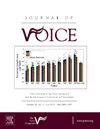Characteristics of Laryngopharyngeal Reflux in the Chinese Nurse Population
IF 2.4
4区 医学
Q1 AUDIOLOGY & SPEECH-LANGUAGE PATHOLOGY
引用次数: 0
Abstract
Objectives
To investigate the prevalence of laryngopharyngeal reflux (LPR) and knowledge of LPR in the Chinese nurse population.
Method
From October 2021 through December 2021, participants were recruited from the PLA General Hospital's Sixth Medical Center. All included participants completed the Reflux Symptom Index (RSI), and LPR was defined as RSI > 13. In addition, each participant was asked to record whether they had any habits such as preferring to consume high-fat food and carbonated beverages, over-eating at dinner, sedentary after meals and lying down within 2 hour after meals, as well as whether they were aware of LPR. For the participants with RSI >13 points, they were treated using diet and lifestyle behavioral recommendations and were prescribed a twice daily pantoprazole (20 mg, 3 months).
Results
A total of 828 participants were included. The positivity and awareness rates of LPR were 3.38% and 55.96%, respectively. RSI scores were significantly higher in LPR-positive subjects than in LPR-negative (16.79 ± 4.43 vs. 1.33 ± 2.33). Among the participants with LPR, there were significant positive association between RSI scores and preferring to consume high-fat food and carbonated beverages, over-eating at dinner, lying down within 2 hour after a meal, and sedentary after meals. RSI scores in 63% of participants with LPR significantly decreased from baseline to 1 month posttreatment. From 1 to 3 months posttreatment, 90% of participants had significantly lower RSI scores than pretreatment.
Conclusions
There are a certain number of LPR patients in the Chinese nurse population, however, knowledge of LPR among nurses is unsatisfactory. Over-eating at dinner, lying down within 2 hour after a meal and sedentary after meals are risk factors for LPR. With combined regular dietary and lifestyle behavioral change and acid-suppressing treatment, most patients with LPR achieve effective remission.
中国护士群体的喉咽反流特征
目的调查中国护士人群中喉咽反流(LPR)的患病率和对 LPR 的认知情况:方法:从 2021 年 10 月至 2021 年 12 月,在中国人民解放军总医院第六医学中心招募参与者。所有参与者均填写了反流症状指数(RSI),RSI > 13 即为 LPR。此外,每位受试者还被要求记录是否有任何习惯,如喜欢食用高脂肪食物和碳酸饮料、晚餐吃得过饱、饭后久坐、饭后两小时内躺下等,以及是否意识到 LPR 的存在。对于RSI大于13点的参与者,他们接受了饮食和生活行为建议的治疗,并被处方每天两次的泮托拉唑(20毫克,3个月):结果:共纳入 828 名参与者。LPR的阳性率和知晓率分别为3.38%和55.96%。LPR 阳性受试者的 RSI 评分明显高于 LPR 阴性受试者(16.79 ± 4.43 vs. 1.33 ± 2.33)。在患有 LPR 的受试者中,RSI 分数与偏好进食高脂肪食物和碳酸饮料、晚餐吃得过饱、餐后两小时内躺下以及餐后久坐之间存在明显的正相关。从基线到治疗后 1 个月,63% 的 LPR 患者的 RSI 分数明显下降。从治疗后 1 到 3 个月,90% 的参与者的 RSI 分数明显低于治疗前:结论:中国护士群体中存在一定数量的 LPR 患者,但护士对 LPR 的了解程度并不令人满意。晚餐吃得过饱、餐后 2 小时内躺下、餐后久坐是 LPR 的危险因素。通过改变规律的饮食和生活行为以及联合抑酸治疗,大多数 LPR 患者可获得有效缓解。
本文章由计算机程序翻译,如有差异,请以英文原文为准。
求助全文
约1分钟内获得全文
求助全文
来源期刊

Journal of Voice
医学-耳鼻喉科学
CiteScore
4.00
自引率
13.60%
发文量
395
审稿时长
59 days
期刊介绍:
The Journal of Voice is widely regarded as the world''s premiere journal for voice medicine and research. This peer-reviewed publication is listed in Index Medicus and is indexed by the Institute for Scientific Information. The journal contains articles written by experts throughout the world on all topics in voice sciences, voice medicine and surgery, and speech-language pathologists'' management of voice-related problems. The journal includes clinical articles, clinical research, and laboratory research. Members of the Foundation receive the journal as a benefit of membership.
 求助内容:
求助内容: 应助结果提醒方式:
应助结果提醒方式:


